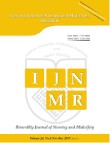Affective responses of the parents after diagnosis of type 1 diabetes in children
Author(s):
Abstract:
Background
These days, diabetes is deemed as one of the most important health–treatment and social- economic problems of the world. Since parents play a major role in treatment of diabetes, the most important part of managing diabetes is in the hands of the parents of children affected by diabetes. This special responsibility will increase the stress and family challenges and impacts parents’ emotional responses. The affective reactions or responses of the parents can also be conveyed to the child himself and reduce self-care, increase glucose levels, increase the possibility of complications and reduce the quality of life. Thus, it is highly important to recognize the affective reactions of parents during various stages of the disease for the purpose of intervention. Therefore, the researcher decided to conduct a study to determine affective reactions of parents after diagnosis of insulin-dependent diabetes in their children. Methods
This study is a prospective descriptive-analytic type. All parents of children diagnosed with insulin-dependent diabetes who came to Sedigheh-ye-Tahereh Endocrinology and Metabolism Research Center were selected, and the SCL90 questionnaire was given to them by the interviewer in five stages (immediately, one month, three months, six months, twelve months after diagnosis). Data were analyzed by using descriptive and analytic statistics and SPSS software. Convenient continuous sampling was used to select 45 people out of whom 10 dropped out during the study. Results
The research findings demonstrate that the major problems of the study subjects at the beginning of diagnosis were depression, anxiety and physical problems, respectively, and three months, six months and twelve months later, they were depression, obsession and physical problems, respectively. Over time, the mean score of parents’ affective reactions declined which indicates the acceptance of the disease by parents over time. Conclusions
In view of the fact that both mother and father of children with diabetes suffer from affective problems and since fathers go to hospitals and diabetes centers less than mothers, some decisions should be made to mentally support both fathers and mothers.Language:
English
Published:
Iranian Journal Of Nursing and Midwifery Research, Volume:17 Issue: 2, Feb 2012
Page:
96
magiran.com/p997846
دانلود و مطالعه متن این مقاله با یکی از روشهای زیر امکان پذیر است:
اشتراک شخصی
با عضویت و پرداخت آنلاین حق اشتراک یکساله به مبلغ 1,390,000ريال میتوانید 70 عنوان مطلب دانلود کنید!
اشتراک سازمانی
به کتابخانه دانشگاه یا محل کار خود پیشنهاد کنید تا اشتراک سازمانی این پایگاه را برای دسترسی نامحدود همه کاربران به متن مطالب تهیه نمایند!
توجه!
- حق عضویت دریافتی صرف حمایت از نشریات عضو و نگهداری، تکمیل و توسعه مگیران میشود.
- پرداخت حق اشتراک و دانلود مقالات اجازه بازنشر آن در سایر رسانههای چاپی و دیجیتال را به کاربر نمیدهد.
In order to view content subscription is required
Personal subscription
Subscribe magiran.com for 70 € euros via PayPal and download 70 articles during a year.
Organization subscription
Please contact us to subscribe your university or library for unlimited access!


